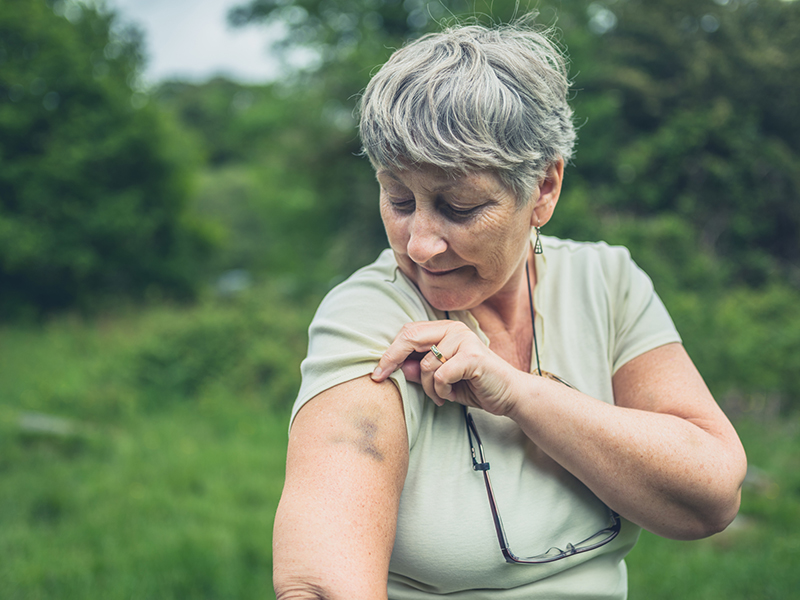
Easy bruising in seniors is a common occurrence but can be prevented with these simple steps from our experts in home care and respite care in Belmont.
We all experience it, particularly as we grow older. Maybe while vacuuming, we run into the edge of the coffee table, never giving it a second thought. Nevertheless, by the following day, a patch of purple hues has spread across the wounded area. How could such a nasty bruise be caused by such a minor accident?
While it may look worrying, easy bruising in seniors is quite common. Thinning skin coupled with a reduced amount of fat can mean that even a small abrasion or bump may result in more extensive bruising than it might for more youthful skin.
The elder care team at Live Free Home Health Care, a provider of respite care in Belmont, NH and the surrounding communities, can help seniors prevent bruising and other injuries. Contact us online or call 603-217-0149 today to schedule a free in-home assessment.
The following strategies can help lessen the chances for bruising, and can also help bruises heal quicker when they do occur:
Protecting Against Bruises:
- Evaluate the senior’s home, both indoors and outdoors, to verify that there are wide, clear walkways. Get rid of any dangers that may cause the person to stumble, trip, or bump into objects. Live Free Home Health Care offers safety evaluations as well, to be sure all of the bases are covered.
- Encourage the senior to wear long-sleeved shirts and long pants when they are doing activities which could cause damage or stress to the skin.
- If the senior is a smoker, help them to quit. Smoking negatively impacts the body’s ability to make collagen, which can lead to easier bruising.
- Be sure the person’s diet contains adequate amounts of vitamin C, which plays a crucial role in the creation of collagen.
- Recognize that certain medicines can increase the likelihood of bruising (but realize too that the senior shouldn’t cease taking any medication without consulting with the doctor):
- Aspirin
- NSAIDs (Advil, Aleve, ibuprofen)
- Anticoagulants (coumadin, heparin)
- Corticosteroids
- Antiplatelet meds
Helping Bruises to Heal:
- Place a cold pack on the bruised area for 20 minutes to decrease blood circulation to that site. This can help reduce the size of the bruise while reducing inflammation.
- If at all possible, raise the area that is bruised.
- Cover the bruise with a compression bandage to minimize swelling.
If a bruise shows up for seemingly no reason, or if you are at all concerned by a particular bruise, call the doctor as soon as possible. This is particularly crucial if the senior has started taking a new medication, or if bleeding is occurring in the gums, nose, or any other area of the body.
At Live Free Home Health Care, our care providers are here to help older adults continue to enjoy a dynamic lifestyle while reducing the likelihood of injury. A few of the various ways we achieve this are through:
- Help with baths/showers and other personal care needs, such as skin care
- Help and support as needed with walking or transferring
- Ensuring a clean and organized home atmosphere that is free of fall hazards
- Assisting with exercise programs to build up balance and strength
- Monitoring for and reporting any changes in condition right away
- And many more
Reach out to us any time to learn more about easy bruising in seniors, for more skin care tips, and to find out about our full range of personalized in-home care services. We are pleased to offer a free in-home assessment at your convenience. Call us today at 603-217-0149 and let us know how we can assist!
